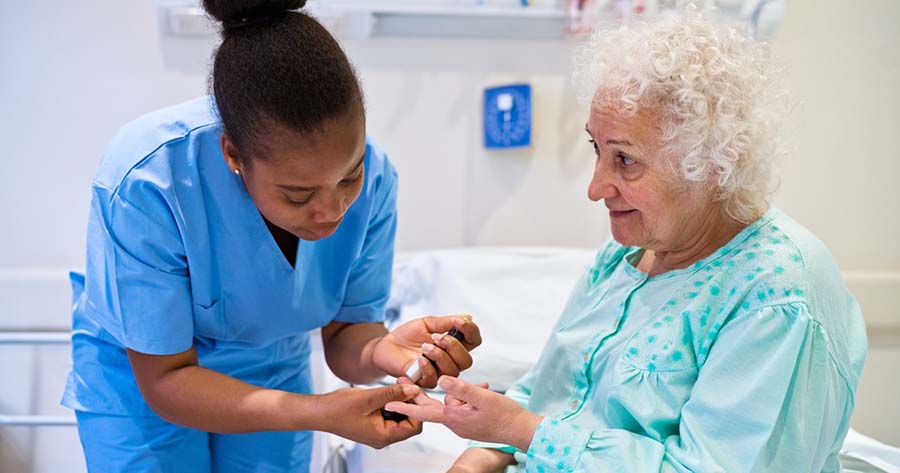Type 1 diabetes in young adulthood is associated with a deterioration in glycaemic control and increased disengagement with clinical services (Diabetes in Scotland, 2013; NHS Scotland, 2013; Scottish Government, 2014). Despite advances in technology and pharmacological therapies, the vast majority of young people (YP) fail to achieve optimal glycaemic control.
In order to improve interaction with clinical services among YP and to improve relationships between YP and healthcare professionals (HCPs), the Youth Engagement Toolkit was developed in Scotland. This toolkit is part of the wider “Making Connections” programme and was developed in partnership between YP, Diabetes Scotland, NHS Scotland and the Childhood and Adolescent Diabetes Group, and was funded by the Scottish Diabetes Group. This article outlines the methods used to develop the toolkit and deliver workshops to HCPs, and describes the approach used to engage meaningfully with YP with type 1 diabetes.
Background
YP encounter many physical, mental and social changes while entering, experiencing and exiting adolescence (Lerner et al, 2010). This can be described as an emotional assault course for YP and they often find themselves having to cope with decision-making responsibilities and independence before they are ready. The way in which YP react and adjust to this and how they are supported to do so, can have a considerably negative impact on their lives. Throwing type 1 diabetes into the mix further exacerbates the problem. The responsibility that comes with a condition that requires a considerable amount of self-management, skills and understanding, and makes YP different from their peers, can be intimidating and overwhelming for them. The key to achieving good outcomes for YP is to support and empower them with positive relationships and influences, and provide services that meet their needs.
When developing services for YP with diabetes, it is important to involve YP in the planning and decision-making processes. YP are best placed to comment on issues that directly affect them and should be central to service development to ensure that services are responsive to their needs. By supporting, encouraging and developing the involvement of YP in this project, we have enabled them to express their views and concerns on these issues. Through this involvement, YP have identified some barriers to receiving the best possible care:
- Lack of trust between YP and HCP.
- A feeling of “judgement” is sometimes experienced at clinic and a “blame culture” can exist.
- Misunderstanding and lack of empathy from HCPs about the social and emotional aspects of living with type 1 diabetes.
- Poor “consistency of care”.
- A feeling of needing to meet the HCP’s agenda, rather than working towards something that is important to YP.
- Unwelcoming clinic environment.
- Lack of opportunities for peer-support.
- Lack of proper support around transition from paediatric to adult services.
To complement this, HCPs reported that they would also welcome new approaches and new ways of working with YP, and have recognised that the current system is not appropriate for YP’s needs. Understanding robust and recognised youth engagement theories (Arnstein, 1969; Checkoway and Gutierrez, 2006) and methodology was an area HCPs were keen to explore further, in addition to using tools and extra skills to improve the dialogue with YP in diabetes clinic appointments.
Aims and objectives
The aim of this project was to develop and deliver innovative Youth Engagement training to HCPs in Scottish diabetes clinics, with supporting material. The main objective was to improve attendance at clinics and promote positive relationships between HCPs and YP. Further long-term objectives are to improve glycaemic control and outcomes for this group. By involving YP in the development and delivery of the toolkit, YP were able to ensure that their voice is heard and their views and opinions are valued. Through active participation, YP can take ownership, and build confidence and trust in the services they are receiving by believing that they are truly responding to their needs.
The project aimed to:
- Put YP at the centre of their own care, promoting better self-management.
- Develop the involvement of YP in service planning and improvement.
- Provide support through peer networks.
- Provide mechanisms to give equal weight to learning from YP’s experiences.
- Ensure HCPs receive training informed by effective person-centred interventions.
- Support the involvement of YP in service planning and improvement.
Method
A total of 22 YP with type 1 diabetes, aged 16–25, were recruited from across Scotland to take part in the project. Diabetes Scotland selected four pilot sites to deliver the work and began forming relationships with HCPs working in these services. Care was taken to ensure that a range of professional roles was represented.
Community Learning and Development principles have been central to the approach and value-base of this project, including self-determination, inclusion, empowerment, working collaboratively and promotion of learning as a lifelong activity (Standards Council for Community Learning and Development for Scotland, 2015). This approach allows YP an opportunity to gain appropriate skills, develop a level of confidence, identify resources, and create the networks they need to tackle problems and grasp opportunities (Scottish Community Development Centre, 2008). By building the capacity of YP, we are enabling them to become successful problem solvers and effective learners, and giving them the self-efficacy they need to manage their condition.
A range of youth participation methods were used to create an open and honest dialogue between Diabetes Scotland staff members and YP involved in the project. The aim was to elicit meaningful and authentic responses, and come up with solutions to the problems they face. Ideas were then developed at a series of group workshops and over the course of a residential weekend. The YP participated in a number of capacity and team-building sessions, which promoted a strong sense of connection among the group and encouraged individuals to support each other.
The tools
A description of the tools that were developed and are used in the toolkit is shown in Table 1. As clinics and services are all designed and delivered in different ways, it was important for the toolkit to be flexible and it had to allow practical application within these boundaries. HCPs have been given the freedom to use the tools provided in whichever way suits them and their service, but have been given guidance on how they can be used in the workshops detailed below. The Youth Engagement Toolkit is shown in Figure 1.
Workshops
Following the production of the toolkit, one-day workshops were designed to provide HCPs with a clear understanding of the background to the toolkit and its potential application. A minimum of two YP were invited to co-facilitate these workshops alongside youth workers on the project, offering authenticity to the day and give real-life examples of living with type 1 diabetes as a young person. By involving YP from both within and outside of each area, HCPs were able to get an insight into YP’s experiences from their own services and from others. All members of the diabetes teams were encouraged to attend, with participants including consultants, DSNs, dietitians, psychologists and diabetes support workers, from both paediatric and adult teams.
The workshops covered four main aspects:
- Principles of youth engagement and the theory behind this approach.
- What it is really like to live with type 1 diabetes as a young adult.
- Why YP developed the tools and their application.
- Youth peer engagement: The benefit of peer-support (both online and face-to-face).
Youth peer engagement activities
YP as informal peer-supporters is also part of the project methodology. The YP involved in the project stressed the benefit of being connected with others their own age who understand the condition and the influence this can have over how they manage their diabetes. YP wanted there to be an opportunity to develop confidence, self-belief and support to pro-actively self-manage their condition and advocate on their own behalf. Peer-support is widely used for people with diabetes and has shown to be effective in normalising the condition and promoting shared learning and advice (Brownson and Heisler, 2009; Lu et al, 2014)
Using the Facebook “closed groups” feature to start the process, YP’s groups have been established in each pilot area to act as a peer-support mechanism for YP aged 16–25. Facebook groups offer a discussion platform where YP can talk to each other anytime, anywhere. The groups are highly valued by people with diabetes (Gilbert et al, 2012). The groups are delivered by the Youth Development Worker at Diabetes Scotland, alongside YP who have been trained to support this. Once these groups have built momentum, the plan is to arrange face-to-face activities so that YP can form a strong network in their area. The YP also have links with HCPs working in their diabetes clinics and it is hoped that this relationship will continue to evolve, creating a sound dialogue between HCPs and YP in their area. YP are keen to work on identifying areas that they would like to explore and would like to invite HCPs to deliver topical sessions to their group. This gives YP ownership and allows them to address what is important to them.
This can also provide added value for HCPs as the YP groups can be consulted on services, establishing trends on issues, or areas of interest. This approach promotes shared decision-making and demonstrates a true partnership.
Results
The results collected so far are certainly short-term improvement markers and give an indication of potential benefit. The initial findings reported below are positive and encouraging, and it is hoped that this will continue over time:
- A total of 58 HCPs have been trained across four pilot sites.
- Thirty-two YP are engaged and involved in developing and delivering the project.
- Follow-up feedback shows HCPs are using the tools and YP appreciate the opportunity for peer-support.
- There are now 45 YP as members on the local Facebook groups.
- YP have held face-to-face meeting in their areas with their group members.
Feedback from YP
Being directly involved in this project has made a huge difference to the way YP manage their condition and their attitudes towards services. Figure 2 shows the feedback from YP involved in project. The quote below illustrates the impact that this approach can have on a young person with type 1 diabetes:
“I used to feel like I got nothing out of going to clinic. I now feel able to ask for help, to speak honestly about any problems and not simply say ‘I’m fine’… I am able to make the most of my appointments.”
Feedback from HCPs
After participating in the workshops, HCPs indicated that they have changed their attitude towards engaging with YP and that the tools have helped support them to develop better relationships with YP:
“My own practice has changed. I have been given new tools to use, and found adopting the right mind-set the most valuable aspect to re-connect with.”
The importance of involving YP in the development and delivery of the toolkit and workshops was also highlighted showing HCPs appreciation for the authenticity of the project and the value of this:
“The YP’s perspective of clinic visits and experience was invaluable and enlightening and made me, as a HCP, reflect on my practice. Their enthusiasm is infectious!”
Ongoing evaluation will include biomedical parameters to track improvements in service attendance and the impact the toolkit may have on YP’s self-management through HbA1c and “did not attend” rates. These will be recorded at 6 months and 12 months and compared with baseline data. Follow-up qualitative feedback will be captured from HCPs on their changes to practice and from YP on their clinic experiences.
Conclusions
For youth engagement with diabetes clinics and self-management to improve, a holistic approach is required to bring about culture change and encourage quality interactions and effective partnership with HCPs. The Youth Engagement Toolkit is only one part of cultivating a culture in which YP are equal partners in their diabetes care. Development of this toolkit has led to:
- Increased engagement and improved relationships between HCPs and YP.
- Strong peer-support networks for YP offering them the emotional and social support they need.
- An opportunity for HCPs to develop their skills and try new and creative methods of engagement to overcome the barriers they face with this age group.
- YP gaining the skills and confidence they need to be able to self-manage their condition.
- YP being at the core of service design and development.
The toolkit will be rolled out to more diabetes clinics across Scotland to ensure a consistent approach to working with YPs.





Key scientific developments presented at the conference.
6 Aug 2025